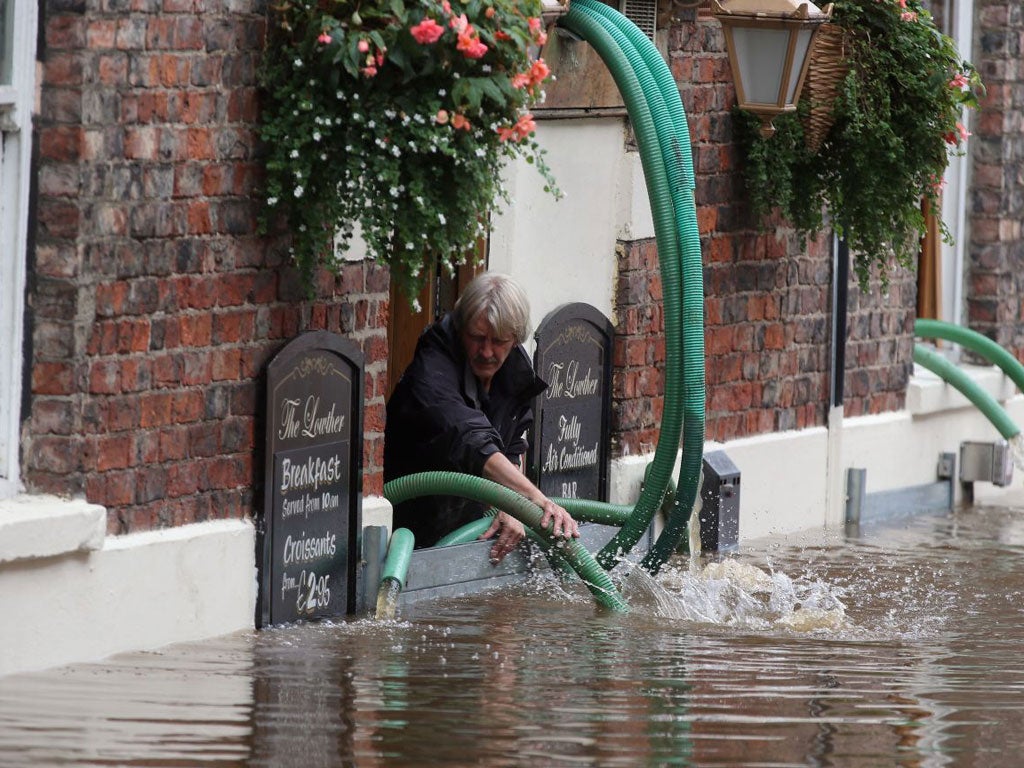Now climate experts warn that every house in the country is at risk of flooding
Sheer volume of rain is overwhelming communities previously considered immune. Jonathan Brown reports

Your support helps us to tell the story
From reproductive rights to climate change to Big Tech, The Independent is on the ground when the story is developing. Whether it's investigating the financials of Elon Musk's pro-Trump PAC or producing our latest documentary, 'The A Word', which shines a light on the American women fighting for reproductive rights, we know how important it is to parse out the facts from the messaging.
At such a critical moment in US history, we need reporters on the ground. Your donation allows us to keep sending journalists to speak to both sides of the story.
The Independent is trusted by Americans across the entire political spectrum. And unlike many other quality news outlets, we choose not to lock Americans out of our reporting and analysis with paywalls. We believe quality journalism should be available to everyone, paid for by those who can afford it.
Your support makes all the difference.The flood waters may finally be receding across parts of Britain lashed this week by the worst autumn storm in 30 years.But as home and business owners begin the long, demoralising task of clearing up the filth left in their wake, it has emerged that increasing numbers of flood victims are completely unaware that they were ever at risk from rising water levels.
Click here to view our graphic of the Summer 2012 rainfall.
Of the 5,000 properties damaged in the extreme weather events of this summer and autumn, more than half were hit not by overflowing rivers but by surface water.
The sheer volume of rain – sometimes up to 20mm in a single hour – has overwhelmed ageing sewage and drainage systems resulting in unprecedented levels of flooding in communities previously considered immune. With the number of properties at risk of flooding expected to quadruple in the next 20 years, according to the Committee on Climate Change, experts warned this week that no home is now without risk.
Charles Tucker, chairman of the National Flood Forum which represents 150 community flood action groups, said intensive rain storm events – of which there have been seven since the beginning of June – can strike at any time. "Anyone can be hit. That is a message that has to be got across to people without scaring the living daylights out of them," he said.
The potential impact was disastrously demonstrated in 2007 in Hull which was hit by devastating flooding caused when road gullies, sewers and drainage ditches were overwhelmed by torrential rain. One person died and 10,000 homes and businesses were deluged. The disaster cost the city £20m and people were still living in emergency accommodation more than a year later
Yet Hull is not alone. This year hundreds of homes were flooded from Bognor Regis to Newcastle upon Tyne in weather scenarios previously thought likely to occur only once every 30, 50 or even 100 years.
Hebden Bridge in West Yorkshire flooded first when the river Calder burst its banks in June and then equally disastrously three weeks later when surface water overwhelmed the drainage system.
The Forum believes that educating people of the threat to their homes has become a priority, while new developments must include the capacity to cope with torrential rain storm events. "All the statutory agencies have to see flooding as one of the major critical challenges which can affect any community in any part of the country and to be prepared for that," said Mr Tucker.
Malcolm Tarling of the Association of British Insurers said this summer had cost £400m and that compensation for surface water damage had become a major issue.
"It means that in theory your property is vulnerable to flooding wherever you live," he said. "If you live near a river you know the state of the defences and what the risk is. But we are seeing an increase in the frequency of these large scale events. Some people are always going to get flooded and insurers expect that. But getting a month's worth of rain in 24 hours is becoming the norm."
The Environment Agency has been tasked with overseeing local authorities' response to the growing threat of surface water. It has started mapping areas at risk and sharing the information nationally. But the agency is already facing cuts to the amount it can spend building traditional river defences.
Government spending on flood prevention fell victim to the Coalition austerity budget. Spending on defences had soared by a third in the wake of the devastating effects of the 2007 summer floods which left homeowners with a £3bn clear-up bill but has subsequently plunged 27 per cent.
It has been estimated the 294 local schemes submitted to the Environment Agency for consideration in 2010 are yet to be given the go-ahead.
Defra insists the total reduction over the four -year period is only six per cent and that it is committed to spending £2.17bn up until 2015 to protect businesses.
It has also sought to kick start new flood schemes by inviting partnerships with local developers or councils, although critics argue that with little money to spare there are few willing takers.
A Defra spokeswoman said: "The new approach is expected to allow up to a third more schemes to go ahead and enable us to exceed our goal to better protect 145,000 homes by 2015."
Yet one of the Government's "success stories" resulting from this partnership approach is Morpeth – where 60 properties were inundated this week.
Alan Bell, chairman of the Morpeth Flood Action Group, said the change of government had delayed a protection scheme designed to safeguard 1,000 homes in the historic market town by up to a year.
Join our commenting forum
Join thought-provoking conversations, follow other Independent readers and see their replies
Comments